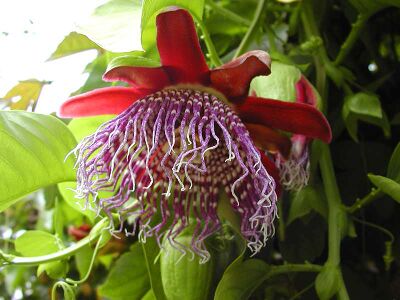None.
The official discord link if you wish to join the discord: https://discord.gg/j5RKwCvAFu
Support the wiki on our official Ko-Fi page or Patreon page!
SCP-1621

|
"Mature Content" |
| This character or verse has mature themes and concepts, thus those of young age are ill-advised to look through these. |

Background
SCP-1621 is an invasive, flowering mimic vine similar to Rhizophora, Tetracoccus, Rafflesia, Viola, and Passiflora. While no specimen of SCP-1621 has ever exhibited sentience or sapience of any sort, all specimens mimicked, albeit imperfectly, locally indigenous species, which originally led to sub-classifications of SCP-1621. Note, however, that only one genotype of SCP-1621 has been identified- all variants are merely adaptive camouflage.
General Information
Name: SCP-1621
Other Names: A Useful Plant
Origin: SCP Foundation
First Appearance: SCP-1621 File log
Company: SCP Foundation
Sex: Monoecious (The vast majority of plants are both male and female at the same time)
Sexuality: Asexual (Most plants reproduce asexually)
Pronouns: It
Age: Unknown
Homeworld: Earth
Residence: Bio-Containment Area-09
Story Role: SCP
Classification: Keter Class
Species: Invasive, Flowering Mimic Vine (Similar to Rhizophora, Tetracoccus, Rafflesia, Viola and Passiflora)
State of Being: Regular
Physiology: Plant Physiology
In-Universe Creator: Unknown
Occupation: None
Containment Status: Contained (Exactly one colony of SCP-1621 is to kept intact within Bio-Containment Area-09)
Affiliations: SCP-1621 Colony
Enemies: Other Plant Life (In all but most arid climates, SCP-1621 wipes out all other plant life around the colony)
Height: Unknown
Weight: Unknown
Status: Alive
Alignment: Unaligned (Plants do not have a sapient enough mind to make decisions based on moral choice)
Threat Level: Street Threat (The flowers, roots and vines of SCP-1621 utilize chlorine trifluoride in place of sap or nectar, the sweet scent of Cl2F6 attracts insects and animals, which at 800 ppm is lethal within fifteen minutes and incapacitating far sooner)
Codex Statistics
Grade: C
Tier: 10-C, High 10-B with volts produced
Cardinality: Finite
Dimensionality: 3-D
Attack Potency: Subhuman level (As a plant it gives off little energy), Above Average Human level with volts produced (Plants produce more than 150 volts)
Durability: Subhuman level
Striking Strength: Subhuman Class
Lifting Strength: Below Average Human Class
Travel Speed: Immobile
Attack Speed: Below Average Human Speed, Unknown: True level expansion speed (Provided with enough carrion, SCP-1621 expands at a rate of ██m/h), Peak Human Speed spore ejection (Plants can emit spore ejection at more than 10 m/s)
Reaction Speed: Below Average Human Reactions
Stamina: Average
Range: Below Standard Melee, Higher through expanding, Tens of Meters with Infestation (SCP-1621 can cause an infestation that can be a 10 meter radius and beyond)
Intelligence: Animalistic Intelligence
Knowledge: Animalistic level
Powers and Techniques
Mimicry (Physiology Mimicr; SCP-1621 is an invasive, flowering mimic vine similar to Rhizophora, Tetracoccus, Rafflesia, Viola and Passiflora. The root structures of SCP-1621 are approximately doubled in area as those it mimics), Body Control (If provided with nutrients from carrion, it will also extrude vines in all directions at a visibly observable pace that continues until the carrion dissolved and the nutrient supply exhausted), Gas Manipulation (SCP-1621 utilize chlorine trifluoride, which at 800 ppm is lethal within fifteen minutes, incapacitating far sooner), Corrosion Manipulation & Poison Manipulation (SCP-1621 sap and nectar are corrosive, toxic, and hypergolic on contact with most combustible materials without a spark or ignition source. Stationary objects are enveloped, slowing during vertical movement, but typically one or more instances of a Cl2F6 reaction have reduced stationary objects to rubble, scrap or ash. SCP-1621 wipes out all other plant life around the colony by way of corrosion, and through Cl2F6 reactions triggered by rainfall).
Resistance to Radiation Manipulation & Heat Maniulation (SCP-1621 has proven resistant to indirect force, radioactivity and heat)
Equipment
Nothing notable.
Other
Standard Tactics: Provided with enough carrion, SCP-1621 expands at a rate of ██m/h. Stationary objects are enveloped, slowing during vertical movement, but typically one or more instances of a Cl2F6 reaction have reduced stationary objects to rubble, scrap, or ash. Once a vine can do so without overlapping with the host stalk, it penetrates the soil and begins to sprout, creating a new stalk and expanding the colony. In all but the most arid climates, SCP-1621 wipes out all other plant life around the colony by way of corrosion, and through Cl2F6 reactions triggered by rainfall.
Containment Records
None.
None.
